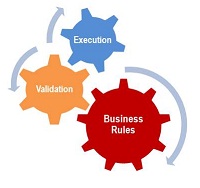Business rules engine

Business rules engine is a lightweight JavaScript library for easy business rules definition of the product, the contract, the form etc.
Key features
The main benefit is that business rules engine is not tight to HTML DOM or any other UI framework. This validation engine is UI agnostic and that is why it can be used as an independent representation of business rules of a product, contract, etc. It can be easily reused by different types of applications, libraries.
- It enables to decorate custom objects and its properties with validation rules.
- It supports declarative and imperative validation rules definition
- declarative JSON schema with validation keywords JSON Schema Validation
- declarative raw JSON data annotated with meta data - using keywords from JQuery validation plugin
- imperative - validation API
- It supports composition of validation rules, that enables to validate custom object with nested structures.
- It is ease to create your own custom validators.
- It supports asynchronous validation rules (uses promises).
- It supports shared validation rules.
- It supports assigning validation rules to collection-based structures - arrays and lists.
- It supports localization of error messages with TranslateArgs.
- It deploys as AMD, CommonJS or plain script module pattern.
- It offers basic build-in constrains validators. See list basic build-in constraints
- Other custom validators can be find in extensible repository of custom validators (work in progress).
Installation
This module is installed:
- Node.js
- npm install business-rules-engine
- use require('business-rules-engine');
- Bower
- bower install business-rules-engine
- Require.js - require(["business-rules-engine/amd/Validation"], ...
- Script tag -> add reference to business-rules-engine/module/Validation.js file.
Example Usage
There are 3 ways how to define validation rules
- declarative JSON schema with validation keywords JSON Schema Validation
- declarative raw JSON data annotated with meta data - using keywords from JQuery validation plugin
- imperative - validation API
JSON Schema Validation
{
FirstName: {
type: "string",
title: "First name",
required: "true",
maxLength: 15
},
LastName: {
type: "string",
"title": "Last name",
required: true,
maxLength: 15
},
Contacts: {
type: "array",
maxItems: 4,
minItems: 2,
items: {
type: "object",
properties: {
Email: {
type: "string",
title: "Email",
default: '',
required: true,
maxLength: 100,
pattern: "S*@S*" },
Mobile: {
type: "object",
properties: {
CountryCode: {
type: "string",
title: "Country code",
required: true,
maxLength: 3,
enum: ["FRA", "CZE", "USA", "GER"]
},
Number: {
type: "string",
title: "Phone number",
required: true,
maxLength: 9
}
}
},
FixedLine: {
type: "object",
properties: {
CountryCode: {
type: "string",
title: "Country code",
required: true,
maxLength: 3,
enum: ["FRA", "CZE", "USA", "GER"]
},
Number: {
type: "string",
title: "Phone number",
required: true,
maxLength: 9
}
}
}
}
}
}
}
JSON data annotated with meta data
// define data structure + validation rules meta data
{
FirstName: {
rules: {required: true, maxlength: 15}},
LastName: {
rules: {required: true, maxlength: 15}},
Contacts: [
{
Email: {
rules: {
required: true,
maxlength: 100,
email: true
}
},
Mobile: {
CountryCode: {
rules: {required: true, maxlength: 3, enum: ["FRA", "CZE", "USA", "GER"] }
},
Number: {
rules: {required: true, maxlength: 9 }
}
},
FixedLine: {
CountryCode: {
rules: {required: true, maxlength: 3, enum: ["FRA", "CZE", "USA", "GER"] }
},
Number: {
rules: {required: true, maxlength: 9 }
}
}
},{maxItems: 4, minItems: 2}
]
}
Imperative definition - using API
To define business rules for some object, you have to create abstract validator.
//create new validator for object with structure<IPerson>
var personValidator = new Validation.AbstractValidator();
//basic validators
var required = new Validators.RequiredValidator();
var maxLength = new Validators.MaxLengthValidator(15);
//assigned validators to property
personValidator.RuleFor("FirstName", required);
personValidator.RuleFor("FirstName",maxLength);
//assigned validators to property
personValidator.RuleFor("LastName", required);
personValidator.RuleFor("LastName",maxLength);
...
To use business rules and execute them on particular data
//create test data
var data = {
Person1:
{
FirstName:'John',
LastName: 'Smith'
},
Person2:{}
}
//create concrete rule
var person1Validator = personValidator.CreateRule("Person 1");
//execute validation
var result = person1Validator.Validate(this.Data.Person1);
//verify results
if (result.HasErrors){
console.log(result.ErrorMessage);
}
//---------
//--outputs
//---------
//create concrete rule
var person2Validator = personValidator.CreateRule("Person 2");
//execute validation
var result = person2Validator.Validate(this.Data.Person1);
//verify results
if (result.HasErrors){
console.log(result.ErrorMessage);
}
//---------
//--outputs
//---------
// FirstName: Field is required.
// LastName: Field is required.
Additional information
- [author blog] (http://rsamec.github.io/)
- [Business rules engine - Tutorial] (https://github.com/rsamec/business-rules-engine/wiki)
[Business rules engine - API] (http://rsamec.github.io/business-rules-engine/docs/index.html)
Examples - rules
- [Business rules repository - sources] (https://github.com/rsamec/business-rules)
- [Business rules repository - API] (http://rsamec.github.io/business-rules/docs/index.html)
Examples - UI with rules
- [NodeJS Example] (https://github.com/rsamec/node-form-app)
- [AngularJS Example] (https://github.com/rsamec/angular-form-app)
- [AngularJS Demo - Forms app] (http://nodejs-formvalidation.rhcloud.com/)
- [Vacation Request form] (http://nodejs-formvalidation.rhcloud.com/#/vacationApproval/new)
- [Hobbies form] (http://nodejs-formvalidation.rhcloud.com/#/hobbies/new)
- [Hobbies form - try it in plunkr] (http://embed.plnkr.co/vbp9aFw7Lc2EyNyhUf5y/preview)
Source code
All code is written in typescript.
npm install -g typescript
To compile to javascript.
tsc src/validation/Validation.ts --target ES5 --module commonjs
Tests
npm install -g mocha
npm install -g expect.js
To run tests
mocha test
Grunt automatization
Basic steps
- git clone https://github.com/rsamec/business-rules-engine
- npm install - get npm packages
- tsd update - get external typings definition
- grunt typings - create node-form typings definition - used by custom validators
To build all sources to dist folder (generates AMD, CommonJS and module pattern)
$ grunt dist
To run code analyze - complexity + jshint.
$ grunt ci
To generate api documentation.
$ grunt document
To generate typings -> typescript definition files.
$ grunt typings
To run tests
$ grunt test
Roadmap
Priority
- Refactor validation API - simplify and better naming
- Support for changes notification -> consider to use framework like ObserveJs or similer notification frameworks
- Refactor implemenation
- use depedency injection for managing dependencies among internal components
- remove depedencies or make them optional - Q, underscore, moment, axiom
- lazy loading + consider better data structure for composite
Others
- Polymer example (using web components)
- Add validation groups to shared validation rules
- Separate ValidationResult from execution of validation rules
- Improve documentation + more examples